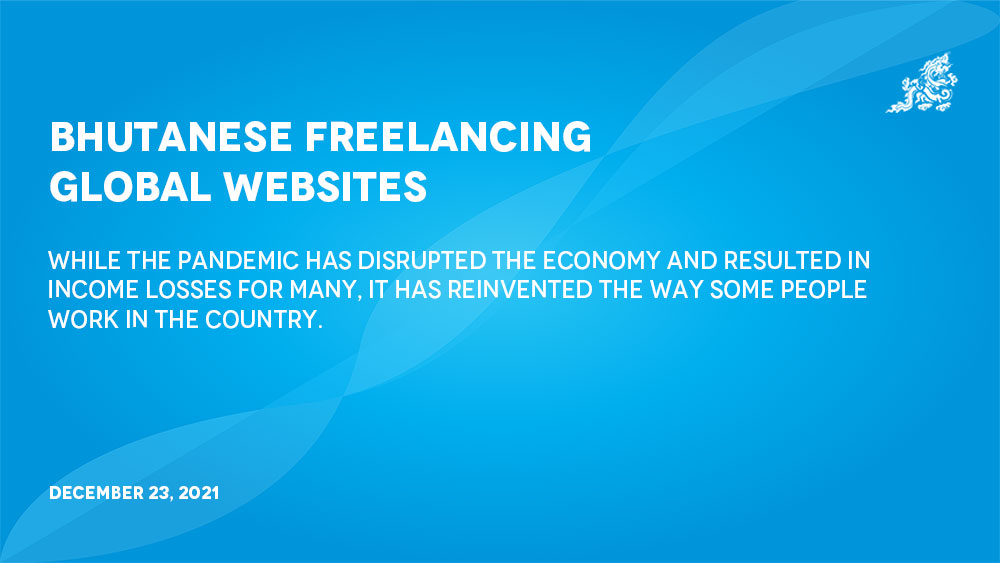Thukten Zangpo
While the pandemic has disrupted the economy and resulted in income losses for many, it has reinvented the way some people work in the country.
Thirteen Bhutanese are engaged as primary freelancers, who directly visit freelance websites like Fiverr based in Israel, Upwork based in the United States of America, and some for companies in Australia to find work.
Eight are engaged as secondary freelancers, working for bigger freelancing companies. Most of them work with Singapore-based freelance companies and earn up to SGD 400, which is equivalent to Nu 22,000 in a month working from home.
All of the freelancers were trained under the Druk Holding and Investments Limited’s (DHI) business acceleration programme (BizAP) and de-suung skilling programme on digital skill-up freelancing earlier this year.
In the freelancing and gig economy, temporary and flexible jobs are commonplace and companies tend to hire independent contractors and freelancers instead of full-time employees via digital platforms.
A freelancer, Lobzang, said that freelancing jobs came as a good opportunity when there were fewer job opportunities due to the Covid-19 pandemic.
He works for Cloud Consulting, a company based in Singapore as a secondary freelancer while he also explores work from the other freelance websites.
Lobzang said that his work involves data entry, maintaining companies’ accounts, generating financial reports, annual general reports, and tax filing. He earns SGD 200 to SGD 400 a month.
“There are more than 100 project-based jobs available on the freelance websites and if we can work, we even earn up to USD 1,000 a month,” he said, adding that the work has to be qualitative and completed on time.
Another freelancer, Jigme Tenzin, has been working with Cloud Consulting for a month now after being an intern with the company for six months.
He uses Xero online accounting software and works from 9 am to 5 pm from Monday to Friday. Xero online accounting software connects businesses with their bank, accountant, bookkeeper, and other business apps.
Jigme Tenzin also finds freelance work from Fiverr and Upwork. He earns SGD 150 a month. He said that working from home saves transportation costs.
Another freelancer, Jetsuen, who has been working with a Singapore-based company for six months now, said that freelancing gives opportunities to people to utilise their skills.
She copy-writes, designs banners, and designs websites.
“I am able to work from home and earn well during the pandemic,” she said, adding that the freelancing culture will grow in Bhutan.
DHI’s senior analyst, Pema Wangchug, said freelancing and gig working was not a success for Bhutan because of the lack of Bhutan-specific domain knowledge.
He said that the specific domain knowledge that worked in other countries would not work in Bhutan, given the internet, logistics, and technicalities in Bhutan. “DHI has built up the house expertise and the domain knowledge to penetrate the global freelancing market with Bhutanese people.”
He said it is not an easy field to penetrate, but once one gets a foothold and momentum, there are good opportunities. “Freelancing is gaining momentum. It will also depend on the person who is selling his or her abilities online to be self-motivated, passionate, proactive, and dedicated.”
In the pool of Bhutanese freelancers, about 15 to 20 more will join after completing the three-month DHI’s BizAP’s aftercare programme that will commence from January next year.
Meanwhile, it was found that 1.1 billion (B) of the 3.5B global workforce are involved in freelancing. The South Asian region is already a hotspot for the burgeoning global freelancing market as of 2021.
Out of the top 500 companies in the world, 33 percent or one-third of them use freelancers across 170 countries with an average hourly wage of USD 19.


